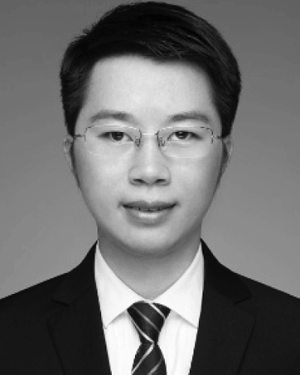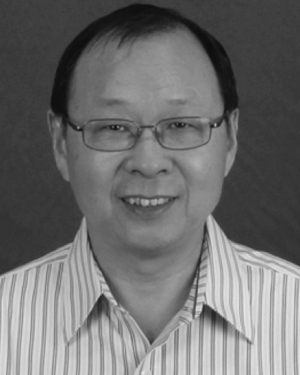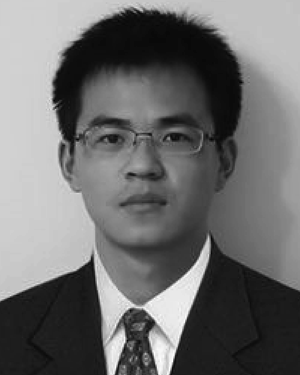Abstract:
In this paper, a novel class of differential-mode (DM) low-pass filter (LPF) with intrinsic common-mode (CM) rejection is proposed for the first time using the hybrid cop...Show MoreMetadata
Abstract:
In this paper, a novel class of differential-mode (DM) low-pass filter (LPF) with intrinsic common-mode (CM) rejection is proposed for the first time using the hybrid coplanar stripline (CPS) and the grounded CPS (G-CPS). The CPS section of the proposed DM LPF only supports DM signals and rejects its counterpart CM intrinsically. Then, the DM performances are left to be focused on in the design process of the proposed DM LPF. By utilizing the feature of high-characteristic impedance CPS and low-characteristic impedance G-CPS transmission lines, two DM LPF prototypes are designed, fabricated, and measured: one for validating the conception of DM LPF with intrinsic CM rejection and another one with the same design specifications for achieving enhanced stopband and miniaturized size simultaneously against the above-designed one. All simulated and measured frequency responses of these two DM LPFs are found to match well with each other, which further demonstrates the claimed superior performances of the proposed LPFs in terms of intrinsic CM rejection, enhanced stopband, and miniaturized size.
Published in: IEEE Transactions on Microwave Theory and Techniques ( Volume: 67, Issue: 5, May 2019)
Funding Agency:

School of Electronic and Information Engineering, South China University of Technology, Guangzhou, China
Lin-Ping Feng (S’16) received the M.S. degree from the University of Electronic Science and Technology of China (UESTC), Chengdu, China, in 2015, and the Ph.D. degree in electrical and computer engineering from the University of Macau, Macau, China, in 2018.
He is currently with the School of Electronic and Information Engineering, South China University of Technology, Guangzhou, China. His current research interests inclu...Show More
Lin-Ping Feng (S’16) received the M.S. degree from the University of Electronic Science and Technology of China (UESTC), Chengdu, China, in 2015, and the Ph.D. degree in electrical and computer engineering from the University of Macau, Macau, China, in 2018.
He is currently with the School of Electronic and Information Engineering, South China University of Technology, Guangzhou, China. His current research interests inclu...View more

Department of Electrical and Computer Engineering, University of Macau, Macau SAR, China
Lei Zhu (S’91–M’93–SM’00–F’12) received the B.Eng. and M.Eng. degrees in radio engineering from the Nanjing Institute of Technology (Southeast University), Nanjing, China, in 1985 and 1988, respectively, and the Ph.D. degree in electronic engineering from The University of Electro-Communications, Tokyo, Japan, in 1993.
From 1993 to 1996, he was a Research Engineer with Matsushita–Kotobuki Electronics Industries, Ltd., Toky...Show More
Lei Zhu (S’91–M’93–SM’00–F’12) received the B.Eng. and M.Eng. degrees in radio engineering from the Nanjing Institute of Technology (Southeast University), Nanjing, China, in 1985 and 1988, respectively, and the Ph.D. degree in electronic engineering from The University of Electro-Communications, Tokyo, Japan, in 1993.
From 1993 to 1996, he was a Research Engineer with Matsushita–Kotobuki Electronics Industries, Ltd., Toky...View more

Skyworks Solutions, Singapore
Songbai Zhang (S’11–M’14) received the B. Eng. and Ph.D. degrees in electrical and electronics engineering from Nanyang Technological University (NTU), Singapore, in 2010 and 2014, respectively.
From 2013 to 2015, he was with the Institute of Microelectronics, Agency for Science, Technology and Research (A*Star), Singapore. Since 2015, he has been a Senior RFIC Design Engineer with Skyworks Solutions, Singapore, where he i...Show More
Songbai Zhang (S’11–M’14) received the B. Eng. and Ph.D. degrees in electrical and electronics engineering from Nanyang Technological University (NTU), Singapore, in 2010 and 2014, respectively.
From 2013 to 2015, he was with the Institute of Microelectronics, Agency for Science, Technology and Research (A*Star), Singapore. Since 2015, he has been a Senior RFIC Design Engineer with Skyworks Solutions, Singapore, where he i...View more

School of Electronic and Information Engineering, South China University of Technology, Guangzhou, China
Lin-Ping Feng (S’16) received the M.S. degree from the University of Electronic Science and Technology of China (UESTC), Chengdu, China, in 2015, and the Ph.D. degree in electrical and computer engineering from the University of Macau, Macau, China, in 2018.
He is currently with the School of Electronic and Information Engineering, South China University of Technology, Guangzhou, China. His current research interests include synthesis microwave circuits, antenna technology, and millimeter-wave monolithic integrated power amplifier and systems.
Lin-Ping Feng (S’16) received the M.S. degree from the University of Electronic Science and Technology of China (UESTC), Chengdu, China, in 2015, and the Ph.D. degree in electrical and computer engineering from the University of Macau, Macau, China, in 2018.
He is currently with the School of Electronic and Information Engineering, South China University of Technology, Guangzhou, China. His current research interests include synthesis microwave circuits, antenna technology, and millimeter-wave monolithic integrated power amplifier and systems.View more

Department of Electrical and Computer Engineering, University of Macau, Macau SAR, China
Lei Zhu (S’91–M’93–SM’00–F’12) received the B.Eng. and M.Eng. degrees in radio engineering from the Nanjing Institute of Technology (Southeast University), Nanjing, China, in 1985 and 1988, respectively, and the Ph.D. degree in electronic engineering from The University of Electro-Communications, Tokyo, Japan, in 1993.
From 1993 to 1996, he was a Research Engineer with Matsushita–Kotobuki Electronics Industries, Ltd., Tokyo. From 1996 to 2000, he was a Research Fellow with the École Polytechnique de Montreal, Montreal, QC, Canada. From 2000 to 2013, he was an Associate Professor with the School of Electrical and Electronic Engineering, Nanyang Technological University, Singapore. In 2013, he joined the Faculty of Science and Technology, University of Macau, Macau, China, as a Full Professor, where he has been a Distinguished Professor since 2016. From 2014 to 2017, he served as the Head of the Department of Electrical and Computer Engineering, University of Macau. He has authored or coauthored more than 430 papers in international journals and conference proceedings. His papers have been cited more than 5480 times with an H-index of 41 (source: ISI Web of Science). His current research interests include microwave circuits, guided-wave periodic structures, planar antennas, and computational electromagnetic techniques.
Dr. Zhu has served as a member of the IEEE MTT-S Fellow Evaluation Committee from 2013 to 2015 and the IEEE AP-S Fellows Committee from 2015 to 2017. He was a recipient of the 1993 First-Order Achievement Award in Science and Technology from the National Education Committee, China, the 1996 Silver Award of Excellent Invention from Matsushita-Kotobuki Electronics Industries, Ltd., and the 1997 Asia–Pacific Microwave Prize Award. He has served as the General Chair of the 2008 IEEE MTT-S International Microwave Workshop Series on the Art of Miniaturizing RF and Microwave Passive Components, Chengdu, China, and the Technical Program Committee Co-Chair of the 2009 Asia–Pacific Microwave Conference, Singapore. He was an Associate Editor of the IEEE Transactions on Microwave Theory and Techniques from 2010 to 2013 and IEEE Microwave and Wireless Components Letters from 2006 to 2012.
Lei Zhu (S’91–M’93–SM’00–F’12) received the B.Eng. and M.Eng. degrees in radio engineering from the Nanjing Institute of Technology (Southeast University), Nanjing, China, in 1985 and 1988, respectively, and the Ph.D. degree in electronic engineering from The University of Electro-Communications, Tokyo, Japan, in 1993.
From 1993 to 1996, he was a Research Engineer with Matsushita–Kotobuki Electronics Industries, Ltd., Tokyo. From 1996 to 2000, he was a Research Fellow with the École Polytechnique de Montreal, Montreal, QC, Canada. From 2000 to 2013, he was an Associate Professor with the School of Electrical and Electronic Engineering, Nanyang Technological University, Singapore. In 2013, he joined the Faculty of Science and Technology, University of Macau, Macau, China, as a Full Professor, where he has been a Distinguished Professor since 2016. From 2014 to 2017, he served as the Head of the Department of Electrical and Computer Engineering, University of Macau. He has authored or coauthored more than 430 papers in international journals and conference proceedings. His papers have been cited more than 5480 times with an H-index of 41 (source: ISI Web of Science). His current research interests include microwave circuits, guided-wave periodic structures, planar antennas, and computational electromagnetic techniques.
Dr. Zhu has served as a member of the IEEE MTT-S Fellow Evaluation Committee from 2013 to 2015 and the IEEE AP-S Fellows Committee from 2015 to 2017. He was a recipient of the 1993 First-Order Achievement Award in Science and Technology from the National Education Committee, China, the 1996 Silver Award of Excellent Invention from Matsushita-Kotobuki Electronics Industries, Ltd., and the 1997 Asia–Pacific Microwave Prize Award. He has served as the General Chair of the 2008 IEEE MTT-S International Microwave Workshop Series on the Art of Miniaturizing RF and Microwave Passive Components, Chengdu, China, and the Technical Program Committee Co-Chair of the 2009 Asia–Pacific Microwave Conference, Singapore. He was an Associate Editor of the IEEE Transactions on Microwave Theory and Techniques from 2010 to 2013 and IEEE Microwave and Wireless Components Letters from 2006 to 2012.View more

Skyworks Solutions, Singapore
Songbai Zhang (S’11–M’14) received the B. Eng. and Ph.D. degrees in electrical and electronics engineering from Nanyang Technological University (NTU), Singapore, in 2010 and 2014, respectively.
From 2013 to 2015, he was with the Institute of Microelectronics, Agency for Science, Technology and Research (A*Star), Singapore. Since 2015, he has been a Senior RFIC Design Engineer with Skyworks Solutions, Singapore, where he is involved in mobile transceiver frontend power amplifier and antenna switch module design. His current research interests include RF/microwave passive devices: filters and antennas, advanced 3-D integrated circuit (IC) packages, and RF integrated circuits (RFICs).
Dr. Zhang was a recipient of the Ministry of Education Scholarship, Singapore (2006–2010) and the NTU Research Scholarship (2010–2014). He was also a recipient of the Best Student Paper Award of the 2013 International Wireless Symposium, Beijing, China. He has served as a Reviewer for the IEEE Transactions on Microwave Theory and Techniques and IEEE Microwave and Wireless Components Letters.
Songbai Zhang (S’11–M’14) received the B. Eng. and Ph.D. degrees in electrical and electronics engineering from Nanyang Technological University (NTU), Singapore, in 2010 and 2014, respectively.
From 2013 to 2015, he was with the Institute of Microelectronics, Agency for Science, Technology and Research (A*Star), Singapore. Since 2015, he has been a Senior RFIC Design Engineer with Skyworks Solutions, Singapore, where he is involved in mobile transceiver frontend power amplifier and antenna switch module design. His current research interests include RF/microwave passive devices: filters and antennas, advanced 3-D integrated circuit (IC) packages, and RF integrated circuits (RFICs).
Dr. Zhang was a recipient of the Ministry of Education Scholarship, Singapore (2006–2010) and the NTU Research Scholarship (2010–2014). He was also a recipient of the Best Student Paper Award of the 2013 International Wireless Symposium, Beijing, China. He has served as a Reviewer for the IEEE Transactions on Microwave Theory and Techniques and IEEE Microwave and Wireless Components Letters.View more

